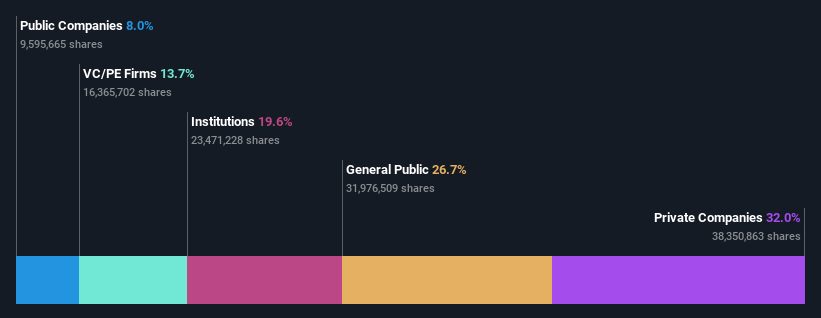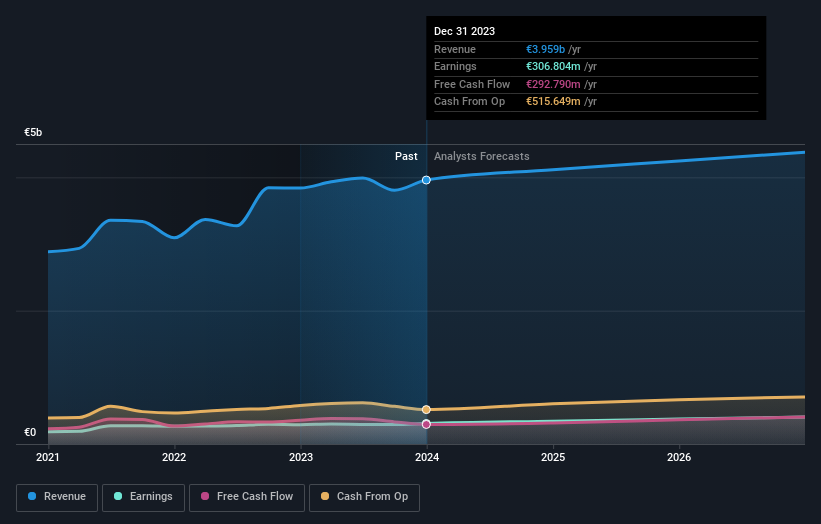Stock Analysis
- Spain
- /
- Auto Components
- /
- BME:CIE
CIE Automotive, S.A.'s (BME:CIE) largest shareholders are private companies with 32% ownership, individual investors own 27%

Key Insights
- The considerable ownership by private companies in CIE Automotive indicates that they collectively have a greater say in management and business strategy
- 54% of the business is held by the top 6 shareholders
- Institutions own 20% of CIE Automotive
If you want to know who really controls CIE Automotive, S.A. (BME:CIE), then you'll have to look at the makeup of its share registry. We can see that private companies own the lion's share in the company with 32% ownership. Put another way, the group faces the maximum upside potential (or downside risk).
And individual investors on the other hand have a 27% ownership in the company.
Let's take a closer look to see what the different types of shareholders can tell us about CIE Automotive.
Check out our latest analysis for CIE Automotive

What Does The Institutional Ownership Tell Us About CIE Automotive?
Institutions typically measure themselves against a benchmark when reporting to their own investors, so they often become more enthusiastic about a stock once it's included in a major index. We would expect most companies to have some institutions on the register, especially if they are growing.
As you can see, institutional investors have a fair amount of stake in CIE Automotive. This suggests some credibility amongst professional investors. But we can't rely on that fact alone since institutions make bad investments sometimes, just like everyone does. If multiple institutions change their view on a stock at the same time, you could see the share price drop fast. It's therefore worth looking at CIE Automotive's earnings history below. Of course, the future is what really matters.

CIE Automotive is not owned by hedge funds. Our data shows that Corporación Financiera Alba, S.A. is the largest shareholder with 14% of shares outstanding. In comparison, the second and third largest shareholders hold about 11% and 10% of the stock.
We did some more digging and found that 6 of the top shareholders account for roughly 54% of the register, implying that along with larger shareholders, there are a few smaller shareholders, thereby balancing out each others interests somewhat.
While it makes sense to study institutional ownership data for a company, it also makes sense to study analyst sentiments to know which way the wind is blowing. There are a reasonable number of analysts covering the stock, so it might be useful to find out their aggregate view on the future.
Insider Ownership Of CIE Automotive
The definition of company insiders can be subjective and does vary between jurisdictions. Our data reflects individual insiders, capturing board members at the very least. The company management answer to the board and the latter should represent the interests of shareholders. Notably, sometimes top-level managers are on the board themselves.
I generally consider insider ownership to be a good thing. However, on some occasions it makes it more difficult for other shareholders to hold the board accountable for decisions.
Our data cannot confirm that board members are holding shares personally. It is unusual not to have at least some personal holdings by board members, so our data might be flawed. A good next step would be to check how much the CEO is paid.
General Public Ownership
The general public, who are usually individual investors, hold a 27% stake in CIE Automotive. This size of ownership, while considerable, may not be enough to change company policy if the decision is not in sync with other large shareholders.
Private Equity Ownership
Private equity firms hold a 14% stake in CIE Automotive. This suggests they can be influential in key policy decisions. Sometimes we see private equity stick around for the long term, but generally speaking they have a shorter investment horizon and -- as the name suggests -- don't invest in public companies much. After some time they may look to sell and redeploy capital elsewhere.
Private Company Ownership
It seems that Private Companies own 32%, of the CIE Automotive stock. It's hard to draw any conclusions from this fact alone, so its worth looking into who owns those private companies. Sometimes insiders or other related parties have an interest in shares in a public company through a separate private company.
Public Company Ownership
We can see that public companies hold 8.0% of the CIE Automotive shares on issue. It's hard to say for sure but this suggests they have entwined business interests. This might be a strategic stake, so it's worth watching this space for changes in ownership.
Next Steps:
I find it very interesting to look at who exactly owns a company. But to truly gain insight, we need to consider other information, too. Be aware that CIE Automotive is showing 2 warning signs in our investment analysis , you should know about...
If you are like me, you may want to think about whether this company will grow or shrink. Luckily, you can check this free report showing analyst forecasts for its future.
NB: Figures in this article are calculated using data from the last twelve months, which refer to the 12-month period ending on the last date of the month the financial statement is dated. This may not be consistent with full year annual report figures.
Valuation is complex, but we're helping make it simple.
Find out whether CIE Automotive is potentially over or undervalued by checking out our comprehensive analysis, which includes fair value estimates, risks and warnings, dividends, insider transactions and financial health.
View the Free AnalysisHave feedback on this article? Concerned about the content? Get in touch with us directly. Alternatively, email editorial-team (at) simplywallst.com.
This article by Simply Wall St is general in nature. We provide commentary based on historical data and analyst forecasts only using an unbiased methodology and our articles are not intended to be financial advice. It does not constitute a recommendation to buy or sell any stock, and does not take account of your objectives, or your financial situation. We aim to bring you long-term focused analysis driven by fundamental data. Note that our analysis may not factor in the latest price-sensitive company announcements or qualitative material. Simply Wall St has no position in any stocks mentioned.
About BME:CIE
CIE Automotive
Designs, manufactures, and sells automotive components and sub-assemblies worldwide.
Flawless balance sheet, good value and pays a dividend.


